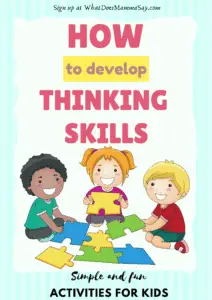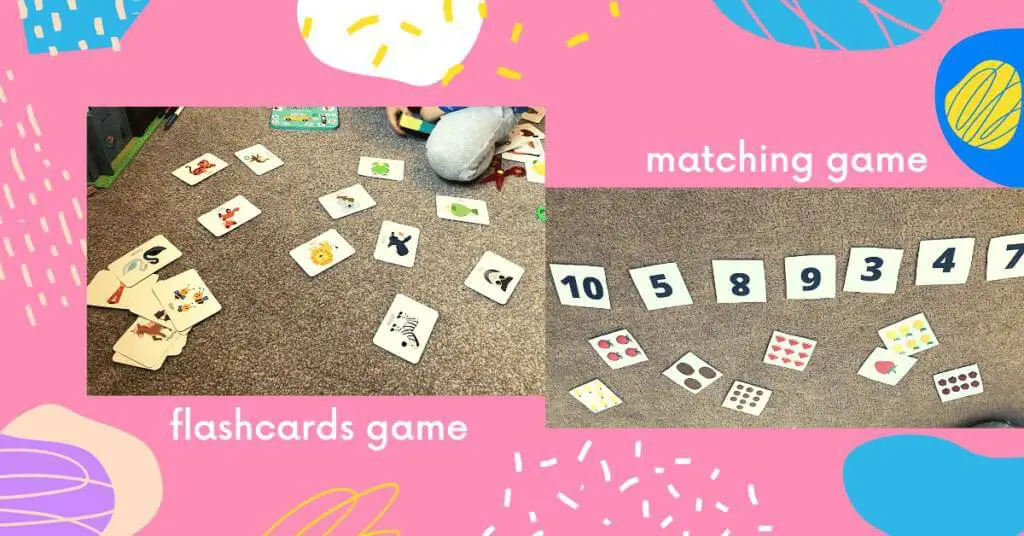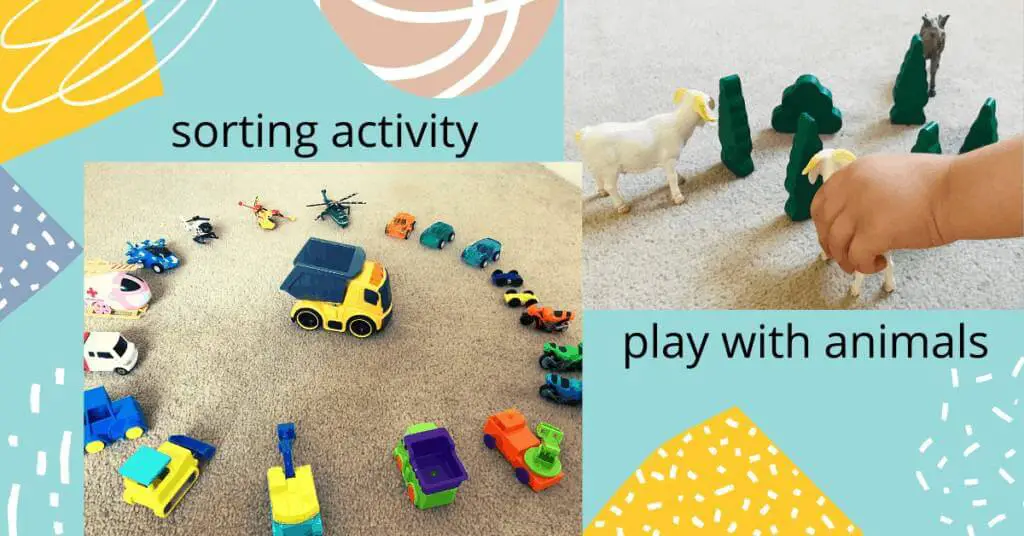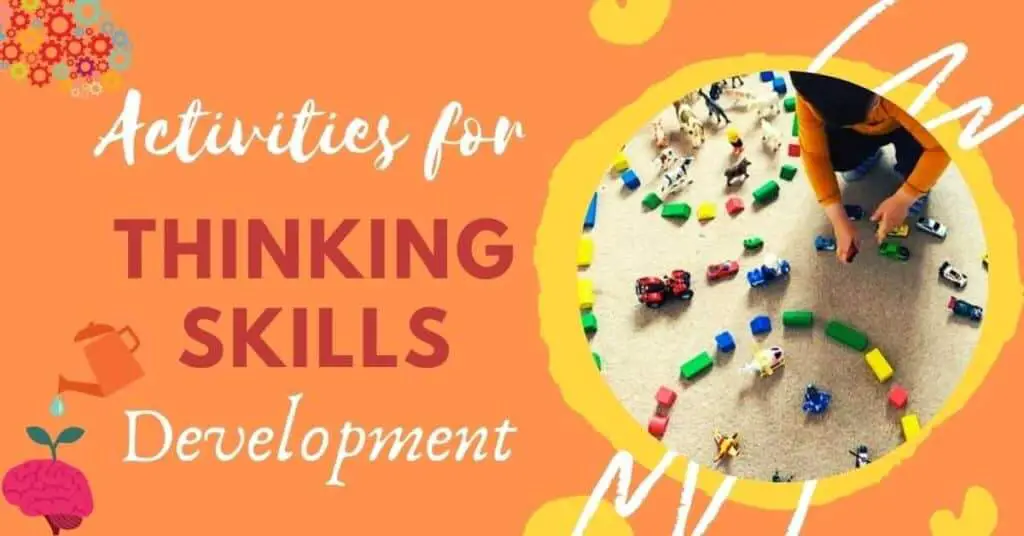In this article you will read about the 4 thinking skills and get 15 hands-on fun activities for thinking skills development in kids.
Children acquire concepts through active involvement and interaction with their environment and construct their own knowledge through this exploration (Piaget, 1962).
Which are considered thinking skills?
Thinking skills are all the mental processes that help us understand information. They involve problem solving, making decisions and thinking critically, and develop our understanding of the world around us.
There are 4 types of thinking skills:
convergent analytical thinking
divergent thinking
critical thinking skills
creative thinking
Convergent analytical thinking refers to using our memory to find the correct answer. It is what we use in most standardised tests. It implies speed, accuracy and logic.
Divergent thinking is quite different, it does not require straight forward answers. But rather it refers to thinking of all possibilities and finding ways of analysing them.

Critical thinking implies that you think about something to form a judgement about it. It requires deduction (use facts to come to a clear conclusion), induction (use patterns and clues to induce an answer) and abduction (you don’t have all the facts but make an educated guess, you can’t be sure however).
Creative thinking is all about alternative, new and innovative ways of looking at things. It implies addressing things from a perspective that hasn’t been used before.
This post may contain affiliate links and I may earn a small commission when you click on the links at no additional cost to you. As an Amazon Affiliate, I earn from qualifying purchases. You can read my full disclosure here.
Activities for thinking skills development
There are many ways in which we can develop thinking skills and children’s games offer plenty of such opportunities. Below you will find great games that children can play and at the same time improve various thinking skills.
Some of the activities below can take the form of free play (directed and initiated by the child) while some others are guided-play, meaning they are directed by the child but the adult is a co-player with intentional teaching aims (you may wish to teach your child turn taking, to identify emotions etc)
1.Emotion cubes
My friend has this idea of sticking feelings flashcards on large building blocks. We know that children love to play with them, so by adding to this a new dimension of identifying and discussing feelings, you get an even greater activity.
While building or playing with them, ask various questions “How does he feel? Why do you think he feels like that? Have you ever felt like that? When?” and discuss.
2.Vehicles
Kids love to play with all sorts of vehicles. From prams to helicopters, hovercrafts, and trains, they are all big favourites. While engaged in such an activity, sit down on the floor with your child, and play together.
Teach children about traffic rules, to distinguish between left and right, how fast to go, safety measures, compare the speed of various vehicles, all sorts of games come to mind. Make it a teaching moment, but don’t divert them from their play.

3.Cards/ Flashcards games
I sort and store my son’s toys into smaller or larger boxes. And add tags. One of the tags says “cards”. My son knows that when he takes that box it is quiet time. There are all sorts of Montessori cards, touch and feel flashcards, opposites flashcards, and many more. He loves to play with them.
I play alongside and we either close our eyes and touch the animals to guess what they are or hide cards and try to find them, many many types of games. Read about flashcard games in a future post. The main thing to remember is that cards or flashcards are a great item to use in play-based learning.
4.Initial Letter Sounds
We have a small magnetic board in the playroom and use it for letters and numbers, or sometimes drawing. When my son feels like playing with the letters on the board, I play a game with him.
I say the sound and the spies and finds the letters. Now we reached the next level, I say the sound and he gives me examples of words starting with that sound.
5.Puzzles
Puzzles are amazing games for toddlers because it helps them in so many ways: concentration, problem-solving skills, fine motor skills, hand-eye coordination, shape recognition. I use them constantly and my son never gets bored.
While making puzzles, I teach my son the parts of the vehicle/animal/plant, planets, you name it. Choose a variety of puzzles that can also teach your child something while using it.

6.Memory games
I usually make my son small flashcards to play memory games. Read all about the benefits of these great games and discover some great ways in which to use them in this Brain-boosting memory games article.
7.Match the socks
While folding laundry, my son likes to play with the clothes. And he discovered that my rolled socks strategy can offer him a nice time, chicking them around like balls. So to avoid doing that I unrolled the socks and asked him to match them back.
He is promised that if he does it, I will roll the socks back into balls so he can play. And he enjoys the matching part so much that he’s become really good at it. So matching socks can be transformed into matching cups, matching any household item you have plenty of and in variety.
8.Noughts and crosses
I bought a bunny noughts and crosses game for my son and I didn’t really think he was ready for it before the age of three. But he saw it one day in the cupboard and asked for it. I took the chance and turned this into a nice teaching activity: at first, we simply separated the noughts from the crosses.
Some months later, we started to take turns putting them on the bunny. And a few more months later I taught him the rules of the game. And you can do this with any kind of simple board game, test it and let your child engage with it. They are always eager to learn.

9.Places around town
Using wooden blocks build streets, parks, and various places around town. Then use cars and helicopters to explore the city, stop and eat at a restaurant, go to the park, go shopping or visit the zoo. So many possibilities and so much teaching with this game.
10.Sink or float
My son loves to play in the water. Who doesn’t, right? So I put some water in a larger bowl and let him play. He usually takes some toys and throws them in. He enjoys playing by himself.
We sometimes play together too and when we do, I teach him about weight and sinking or floating.
11.Sorting activities
Because children have many toys of the same type: building blocks, vehicles, figurines, animals, try to teach them sort toys according to type, size, materials, use etc. I often find myself sorting toys with my son.
I taught him sorting according to various criteria some months back and I can see he enjoys it still. You can sort vehicles according to where we see them (on the street, at the farm, at the airport), animals according to where they live, building blocks according to size, color, and so on.

Read about how to make sorting fun and discover ideas of what you can sort.
12.Play with toy animals
Playing with toy animals creates multiple learning opportunities. You can teach your child about what they eat, their habitat, body parts, wild and domestic.
You can even create a scene from a classic story, such as The Three Little Pigs or Three Billy Goats Gruff. We have so much fun acting out with animals!
13.Read by yourself
We have many books in our home as both my husband and I love reading. And while growing up I made a ritual of taking my son to the library every Wednesday for a playgroup and to borrow books.
We go through 30 books a month now and so my son has learned to love books too. You can find a lot of interest books on our bedtime stories section of the blog.
Because we read the same books over and over again, my son started to remember some words, whole books in some cases (rhyming books), or for some, he likes to retell the story using his own words when he doesn’t remember. Perfect learning opportunity!

14.Lego constructions
Have you ever heard of a child who didn’t like Lego? Never? Neither have I! And my son is no exception. We love them. We build strange things, we add wheels, we use a lego shop, a Lego Duplo number train, a small lego set, combine them all and let our imagination free.
We also like to take apart the pieces of a lego boat or helicopter and put them back again without looking at the instructions. It’s really good practice for cognitive skills. And fine motor skills and creativity. A top choice on our list!
More thinking skills activities for kids
You can find other great learning activities in the Teaching Numbers to Toddlers article. If you prefer more focus on memory activities, read brain-bosting memory match games. Also, delve into multiple intelligences theory and discover great activities for logical-mathematical learners.
We would love to hear about what games and activities you do with your children. The more we share, the more we help others!
DON’T FORGET:
We share all of our ideas on our Facebook group Learning Activities for Kids.

Hi. I am Monica, an experienced ESL teacher and early years student, mother to a preschooler and passionate reader.


This post is very informative and has a great list of activities that’s important for thinking skills development. We have done most with the exception of the emotion cubes and notches and crosses. I’ll have to look into these!
Maureen | http://www.littlemisscasual.com
These are great resources.
This is a great list. Very informative. My little one and I were just playing match the socks this morning while we folded the laundry!
I think matching the socks is a great idea! My son loves playing with socks! lol